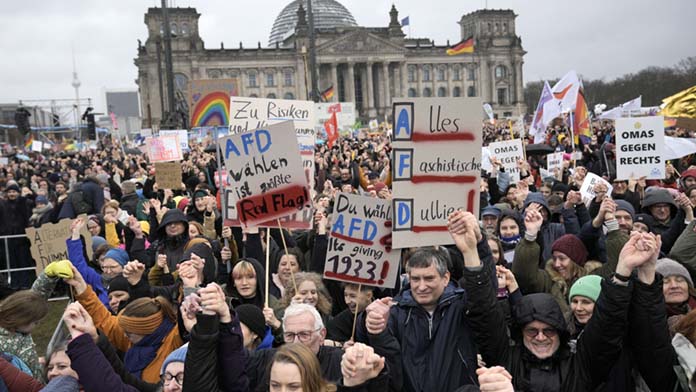About 1.4 million people marched across Germany at the end of January against the far right AfD (Alternative for Germany) party.
The country has been rocked by revelations that leading AfD politicians secretly met open Nazis to discuss organising mass deportations, targeting millions of migrants, asylum-seekers and German citizens of foreign origin.
This meeting was not the first of its kind and signals the increasing confidence of the racist far right. The German political world has reacted with an outpouring of rage. The political mainstream, such as German Premier Olaf Scholz, have condemned the AfD as leading “an attack against our democracy”.
However, it is mainstream parties like Scholz’s Social Democratic Party (similar to our Labor Party) who have helped legitimise such disgusting racism through their willingness to make concessions on refugee rights. This has ranged from allowing the suspension of family reunification rights to signalling support for the outsourcing of asylum applications to African countries.
Last October, in response to pro-Palestine protests in Germany, he was quoted as saying, “We must finally deport on a large scale.”
The policies of neoliberalism and austerity which have been pursued by successive German coalition governments have given oxygen to the AfD, which has attempted to capitalise on the discontent. The current government has doubled the military budget, raised fuel prices and is failing to reach even its own climate targets.
The AfD is currently polling more than 20 per cent of the vote, making it Germany’s second largest party. It has 78 seats in the national parliament and 40,000 members. The party has an organised hard right wing including leading figure Bjorn Hocke with direct links to Nazis.
Rising far right
What has led to the rise of a European far right with so much legitimacy? The mainstream parties’ commitment for decades to austerity policies combined with the rising cost of living has produced deep bitterness with the political system.
Mainstream electoral parties have also increasingly embraced anti-refugee policies and racist and Islamophobic talking points. This has only legitimised and fuelled the far right.
Suella Braverman, the former British Tory Home Secretary, openly used racism to label asylum-seekers a threat, characterising them as an, “existential challenge for the political and cultural institutions of the West”.
Similarly, Italian fascist Prime Minister Giorgia Meloni has struck a deal to process asylum-seekers rescued at sea in offshore detention camps in Albania, after a green light from the European Union. Left-wing critics such as the leader of the More Europe party Riccardo Magi have described this as an “Italian Guantanamo”.
The far right is still on the rise across Europe. Geert Wilders, who was sentenced for hate speech after advocating the ethnic cleansing of Moroccan-Dutch people in 2017, won the Dutch elections in November with his PVV party on a platform of explicit Islamophobia, calling for the removal of “Islamic schools, mosques and the Quran”.
In Slovakia recently elected Prime Minister Robert Fico said in 2016 he wouldn’t accept “one single Muslim” migrant.
In France Marine Le Pen’s National Rally looks set to come first in this year’s European elections, with the total vote for far right parties at 37 per cent, and could win the next presidential election.
The resistance by the European mainstream liberal, centre and centre-left parties has been weak at best and cravenly opportunistic at worst.
French President Emmanuel Macron, in a desperate attempt to avoid being outflanked by Le Pen, has engaged in his own Islamophobic and anti-migrant policy decisions, recently passing a racist and controversial law making it harder for migrants’ children to become citizens and cancelling residence permits on vague grounds of opposing “Republican values”.
This passed parliament only due to the support of the fascist National Rally, which claimed the bill as “an ideological victory”.
French student activists have protested and blockaded universities and union leaders have condemned the law. A few workplaces were able to hold anti-racist strikes but the union leaders failed to mobilise action on the scale needed.
The cowardly opportunism of the French centre under Macron, and the troubling rise of the right as well as the normalisation of its policies and rhetoric, points to the need to build the grassroots anti-racist struggle urgently.
The political mainstream of Europe has both made concessions to the racist rhetoric of the far right and failed to build a fighting alternative on the streets.
It is therefore up to rank-and-file workers, together with left-wing activists and students, to build the mass anti-racist struggle needed.
By Jack Stubley






